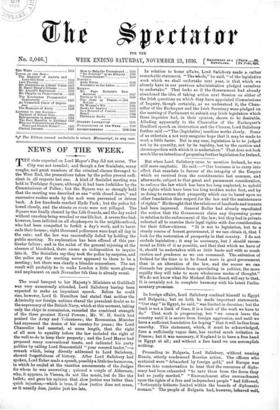The usual banquet to her Majesty's Ministers at Guildhall was
very numerously attended, Lord Salisbury having been expected to make an important speech. Before he could rise, however, Lord G. Hamilton had stated that neither the Admiralty nor foreign nations shared the prevalent doubt as to the supremacy of the British Navy, which at this moment, taking only the ships in commission, exceeded the combined strength of the three greatest Naval Powers ; Mr. W. H. Smith had praised the Army and Volunteers ; the Roumanian Minister had expressed the desire of his country for peace ; the Lord Chancellor had asserted, at some length, that the right of all men to equality before the law included the right of the well-to-do to keep their property ; and the Lord Mayor had proposed many conventional toasts, and indicated his party politics by calling Lord Beaconsfield "your revered leader,"—a remark which, being directly addressed to Lord Salisbury, showed forgetfulness of history. After Lord Salisbury had spoken, Lord Esher made a speech, possibly a little too humorous, in which he smiled at the vacation amusements of the Judges for whom he was answering ; quizzed a couple of Aldermen, who, it appears, in Vienna, do not like music, but do like the ballet ; and gave his opinion that slow justice was better than quick injustice,—which is true, if slow justice does not mean, as it usually does, justice just too late.


































